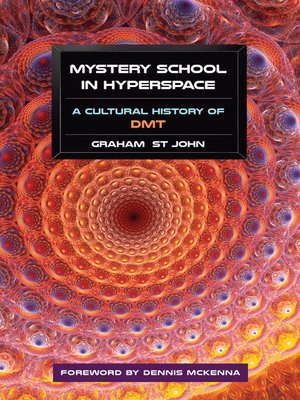
Sign up to save your library
With an OverDrive account, you can save your favorite libraries for at-a-glance information about availability. Find out more about OverDrive accounts.
Find this title in Libby, the library reading app by OverDrive.



Search for a digital library with this title
Title found at these libraries:
| Library Name | Distance |
|---|---|
| Loading... |
Since the mid-1950s, the psychoactive compound DMT has attracted the attention of experimentalists and prohibitionists, scientists and artists, alchemists and hyperspace emissaries. While most known as a crucial component of the “jungle alchemy” that is ayahuasca, DMT is a unique story unto itself. Until now, this story has remained untold. Mystery School in Hyperspace is the first book to delve into the history of this substance, the discovery of its properties, and the impact it has had on poets, artists, and musicians.
DMT has appeared at crucial junctures in countercultural history. William Burroughs was jacking the spice in Tangier at the turn of the 1960s. It was present at the meeting between Ken Kesey's Merry Pranksters and Tim Leary's associates. It guided the inception of the Grateful Dead in 1965. It showed up in Berkeley in the same year, falling into the hands of Terence McKenna, who would eventually become its champion in the post-rave neo-psychedelic movement of the 1990s. Its indole vapor drifted through Portugal's Boom Festival and has been evident at Nevada's Burning Man, where DMT has been adopted as spiritual technology supplying shape, color, and depth to a visionary art movement. The growing prevalence of use is evident in a vast networked independent research culture, and in its impact on fiction, film, music and metaphysics. As this book traces the effect of DMT's release into the cultural bloodstream, the results should be of great interest to contemporary readers.
The book permits a broad reading audience to join ongoing debates in studies in consciousness and theology where the brain is held to be either a generator or a receiver of consciousness. The implications of the "spirit molecule" or "the brain's own psychedelic" among other theories illustrate that DMT may lift the lid on the Pandora's Box of consciousness.
Features a foreword by Dennis McKenna, cover art by Beau Deeley, and thirty color illustrations by various artists, including Alex Grey, Android Jones, Martina Hoffmann, Luke Brown, Carey Thompson, Adam Scott Miller, Randal Roberts, along with Jay Bryan, Cyb, Orryelle Defenestrate-Bascule, Art Van D'lay, Stuart Griggs, Jay Lincoln, Gwyllm Llwydd, Shiptu Shaboo, Marianna Stelmach, and Mister Strange.
Regarded as the “nightmare hallucinogen” or celebrated as the “spirit molecule,” labelled “psychotogenic” or “entheogenic,” considered a dangerous drug or the suspected X-factor in the evolution of consciousness, DMT is a powerful enigma. Documenting the scientists and artists drawn into its sphere of influence, navigating the liminal aesthetics of the “breakthrough” experience, tracing the novum of “hyperspace” in esoteric and science fiction currents, Mystery School in Hyperspace excavates the significance of this enigmatic phenomenon in the modern world.
Exposing a great many myths, this cultural history reveals how DMT has had a beneficial influence on the lives of those belonging to a vast underground network whose reports and initiatives expose drug war propaganda and shine a light in the shadows. This conversation is highly relevant at a time when significant advances are being made to lift the moratorium on human research with psychedelics.
DMT has appeared at crucial junctures in countercultural history. William Burroughs was jacking the spice in Tangier at the turn of the 1960s. It was present at the meeting between Ken Kesey's Merry Pranksters and Tim Leary's associates. It guided the inception of the Grateful Dead in 1965. It showed up in Berkeley in the same year, falling into the hands of Terence McKenna, who would eventually become its champion in the post-rave neo-psychedelic movement of the 1990s. Its indole vapor drifted through Portugal's Boom Festival and has been evident at Nevada's Burning Man, where DMT has been adopted as spiritual technology supplying shape, color, and depth to a visionary art movement. The growing prevalence of use is evident in a vast networked independent research culture, and in its impact on fiction, film, music and metaphysics. As this book traces the effect of DMT's release into the cultural bloodstream, the results should be of great interest to contemporary readers.
The book permits a broad reading audience to join ongoing debates in studies in consciousness and theology where the brain is held to be either a generator or a receiver of consciousness. The implications of the "spirit molecule" or "the brain's own psychedelic" among other theories illustrate that DMT may lift the lid on the Pandora's Box of consciousness.
Features a foreword by Dennis McKenna, cover art by Beau Deeley, and thirty color illustrations by various artists, including Alex Grey, Android Jones, Martina Hoffmann, Luke Brown, Carey Thompson, Adam Scott Miller, Randal Roberts, along with Jay Bryan, Cyb, Orryelle Defenestrate-Bascule, Art Van D'lay, Stuart Griggs, Jay Lincoln, Gwyllm Llwydd, Shiptu Shaboo, Marianna Stelmach, and Mister Strange.
Regarded as the “nightmare hallucinogen” or celebrated as the “spirit molecule,” labelled “psychotogenic” or “entheogenic,” considered a dangerous drug or the suspected X-factor in the evolution of consciousness, DMT is a powerful enigma. Documenting the scientists and artists drawn into its sphere of influence, navigating the liminal aesthetics of the “breakthrough” experience, tracing the novum of “hyperspace” in esoteric and science fiction currents, Mystery School in Hyperspace excavates the significance of this enigmatic phenomenon in the modern world.
Exposing a great many myths, this cultural history reveals how DMT has had a beneficial influence on the lives of those belonging to a vast underground network whose reports and initiatives expose drug war propaganda and shine a light in the shadows. This conversation is highly relevant at a time when significant advances are being made to lift the moratorium on human research with psychedelics.







